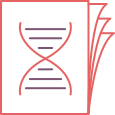What to do if you suspect a rare genetic disease of obesity
Individuals who don’t know that they may be living with a rare genetic disease of obesity often need to begin their diagnostic journey by trusting their feelings. You may have already recognized that the unstoppable weight gain and insatiable hunger are very different from the experience of others who are overweight. If you are unsure about these symptoms or don’t know if you should speak to your doctor about rare genetic diseases of obesity, taking the below assessment may help.
Watch this video to learn more about the path to getting diagnosed with a rare genetic disease of obesity.
Searching for Answers: Molly and Joshua’s Story
Joshua is 3 years old but is the height of a 6 year old and the weight of maybe a 9-10 year old.
Joshua was born a normal weight but he continued gaining weight right from the start. He gained 6 pounds between a 4- and a 6-month checkup and gained about a pound a week thereafter.
MOLLY
Mom of Joshua, living with a suspected rare genetic disorder of obesity
So I started keeping food logs and said, “This is how many calories he’s consuming. Would this amount justify this amount of weight gain that we’re seeing?” And I ended up hearing no.
He’s physically going over to the cabinet and requesting that snack or requesting the bottle or requesting another food item, and that’s happening continually through the day. So we believe that he is just continually feeling hungry.
So then we went into “Who can find answers for us?” mode.
Instinctually you know; we had continued going to the doctors and explaining that something’s just not quite right or different with Joshua than our other 2 children, and we got a lot of fussy baby syndrome, colicky baby syndrome. But that fussiness continued, and that instinct remained in my husband and I that something’s different and he is growing at a rapid rate.
Joshua’s doctors suggested genetic testing
Every time we revisit a doctor or go to a new doctor and hear “We without a doubt believe Joshua has a rare genetic disorder of obesity,” it’s validating, and it reminds us that it’s not our fault. We didn’t do anything to cause this.
The best 2 pieces of advice that I have ever received and will give are number 1: trust your instincts, and 2: don’t be scared to speak up. You are your child’s voice. You know your child best, and you are the one that’s going to step forward and make those choices and make those changes for them.
Rhythm is dedicated to shedding light on rare genetic disorders of obesity
If you suspect that you or someone you know might have a rare genetic disorder of obesity, follow your instincts and talk to a doctor
LEAD for Rare Obesity logo
www.LEADforRareObesity.com
facebook.com/LEADforRareObesity
© 2018 Rhythm Pharmaceuticals. All rights reserved. MC4R-C0088 December 2018.
When to speak with your doctor about testing for a rare genetic disease of obesity
Take this brief assessment to learn if you or someone you care for may be living with an undiagnosed rare genetic disease of obesity.
ONE
- Yes
- No
- I don't know
TWO
- Yes
- No
- I don't know
THREE
- Yes
- No
- I don't know
Results
Based on your results, a rare genetic disease of obesity may not be a factor for you or someone you care for. But it’s still important to talk to the doctor about symptoms.
Based on your results, you or someone you care for may be affected by a rare genetic disease of obesity and it may be time to talk with a doctor about next steps. Your doctor can schedule an evaluation to look for key clinical features of these rare diseases. He or she can also order a genetic test to uncover any gene variants gene variants Changes (also known as variants) in the standard “spelling” of a gene. Gene variants can result in serious health problems or be “silent” with no negative health effects. linked to rare genetic diseases of obesity. This information could help the physician confirm a diagnosis.
What happens next?
If you feel that you or someone you care for may have a rare genetic disease of obesity, consider these next steps:

1.
Talk to your doctor
Start a conversation about your specific symptoms and your personal and family medical history. If you think you or someone you care for may have a rare genetic disease of obesity, say so. Here are some helpful hints.

2.
Consider genetic testing
Genetic testing may provide useful information to you and your doctor. Learn more about the Uncovering Rare Obesity® genetic test here. As part of the program, you may speak with a genetic counselor at no charge before deciding to take the test.

3.
Review the results
Genetic counselors can be helpful resources. They are trained to evaluate the results of genetic testing and help you understand possible next steps. Genetic counselors are available through the Uncovering Rare Obesity® program. Learn more here.
The importance of testing
- Potential eligibility for clinical studies
- Appropriate disease management options
- A possible diagnosis

I think I may have a rare genetic disease of obesityWhere can I connect with people like me?

